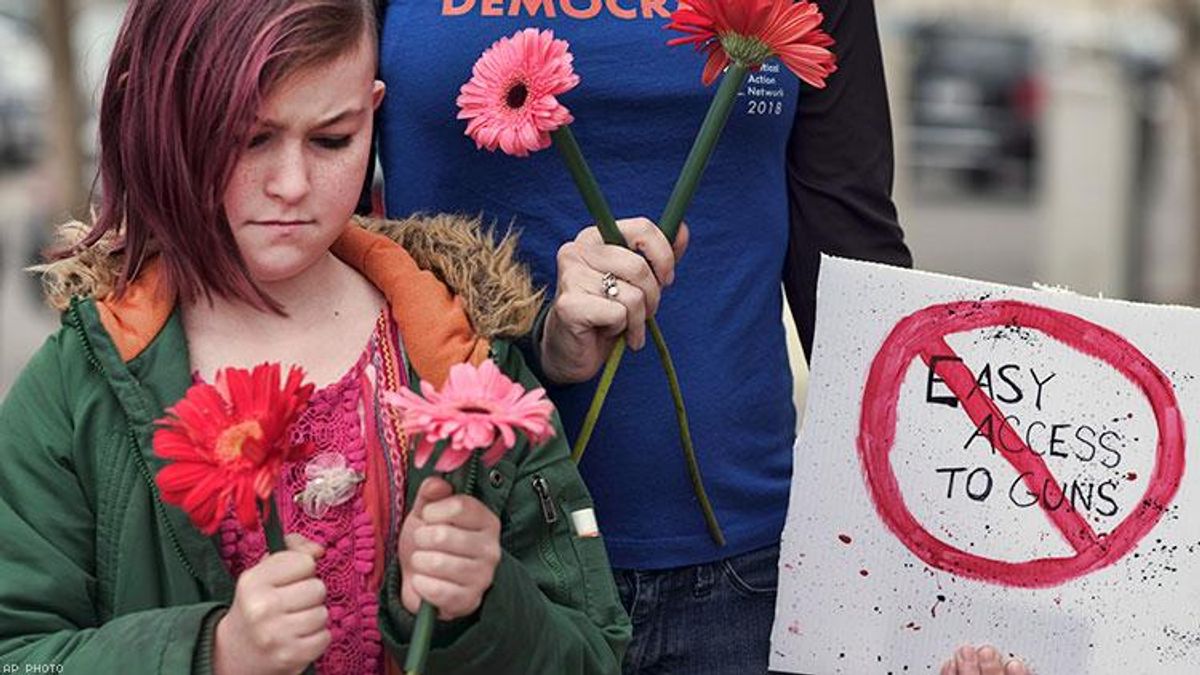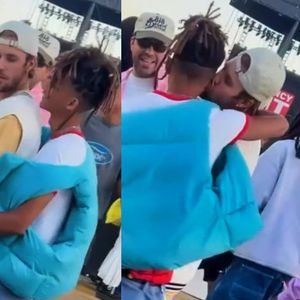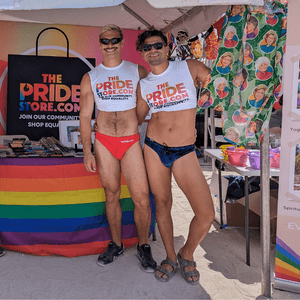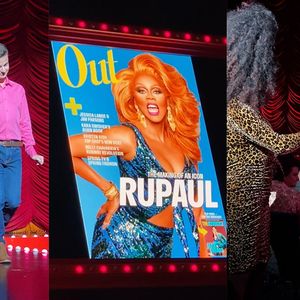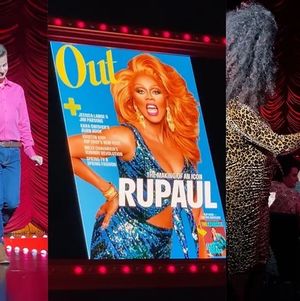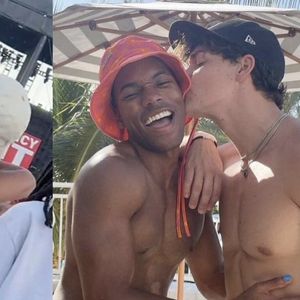A new gun control bill just got signed into law in Florida, a state struck dramatically by mass shootings in recent years. But LGBT activists who have lobbied for gun control in the wake of Pulse, Parkland, and a plethora of other tragedies offered mixed reviews of the legislation. Some celebrated passage of any reform in a state where the National Rifle Association enjoys remarkable influence, while others labeled the bill a half-measure or worse, a law that will enable more shootings by putting extra guns inside schools.
Passing anything brought jubilation in certain quarters. After Republican governor Rick Scott signed a bill into law, Everytown For Gun Safety praised the legislation. "This is a big deal," said Everytown president John Feinblatt. "With the whole nation watching, the NRA's stranglehold over the Florida legislature is officially broken." Feinblatt knows any gun control legislation in the Sunshine State will meet resistance.
An out gay man, Feinblatt previously served as chief policy advisor for New York Mayor Michael Bloomberg and worked with the now-retired politician to form Everytown. After the Pulse shooting claimed 49 innocent lives in an Orlando gay bar, Feinblatt wrote in The Advocate about how the LGBT movement could bring about change in gun laws in Florida and elsewhere.
"The gun safety movement already owes a strategic debt to gay rights activists, who know a thing or two about winning on an issue that at first proved divisive," he wrote. "Every campaign needs its generals. AIDS and marriage equality, though, showed how essential it is to have an army -- the activists who share their stories, create urgency, and move more people to join the cause."
No meaningful gun reforms came directly from the Pulse shooting, though, at the federal or state level. But when a shooting left 17 dead at Marjory Stoneman Douglas High School in Parkland, Fla., movement came at last, if only a little of it. The bill just signed by Scott raises the minimum age for purchasing firearms from 18 to 21, something that has already incited a lawsuit from the NRA. It also prohibits purchase of bump stocks like the one used in the Las Vegas shooting to make rifles even more deadly, and it strengthens background checks performed before anyone in Florida can buy a gun.
But it stops far short of banning assault rifles, and Florida lawmakers forfeited a chance to institute a ban on the assault-style weapons used to deadly effect in Pulse and at Parkland. State Rep. Carlos Guillermo Smith, an Orlando Democrat, filed an assault weapons ban as his first bill when he was elected months after the Pulse shooting. The out Latino lawmaker, who keeps a rainbow ribbon on his desk on the House floor to remind him of the "Fallen 49" killed at Pulse, says lawmakers did a disservice by not letting his bill out of committee this year. In fact, when students from Parkland attended House hearings shortly after the shooting, Democrats made a motion to bring Guillermo Smith's bill directly to the floor for consideration, and the Republican-dominated chamber infamously voted 71-36 against doing so.
"I'm really upset about it," Guillermo Smith says. "Gun safety has been one of my most important issues."
Yet he couldn't support the bill that ultimately landed on the governor's desk. Guillermo Smith and most Democrats in the legislature dissented, in large part because of a provision to arm certain school personnel who go through special training and have concealed carry permits. "The Parkland community and the students who spoke out in the aftermath of the tragedy there made two things clear when they spoke to us," he says. "They were demanding an assault weapons ban, and they were opposed to arming teachers. So what did this legislature roll out? A proposal that doesn't ban assault weapons and arms teachers."
State Rep. David Richardson, a Democrat and Florida's only other openly gay lawmaker now in office, also voted against the gun bill. He did note significant issues were addressed before the bill earned its final passage. Notably, classroom teachers will not be allowed to carry weapons, and the so-called school guardian program will be largely limited to administrators, coaches and other support staff. "It was definitely an improvement, but it was not enough," Richardson says. He remains concerned about students getting hold of guns and using them to hurt others or themselves.
Without the school guardian program, both Guillermo Smith and Richardson say they would have voted for the legislation. "In the end it was a difficult decision," Richardson says. "I wanted to see something advance in terms of gun control and gun violence prevention. But the fact an assault weapons ban wasn't even considered, that bothered me. And my second concern was the 'guardian' program."
As gun control dominated the final days of Florida's legislative session, Guillermo Smith made time to host roundtables in Orlando, one of which included four survivors of the Pulse shooting. At those events, he says, his constituents demanded an assault weapons ban. He asked those present if they supported the bill in its current form, and to a hand all said no. But he asked constituents if they would back the bill absent the guardian program, even though it did not include a ban on assault-style weapons, and then a majority supported the bill. "Would they have been disappointed that there was no assault weapons ban? Of course," he says. "But it was no poison pill."
What Happened?
Indeed, the majority of organizations in Florida fighting for gun control came out against the bill. That includes Gays Against Guns, an organization formed in the wake of Pulse that employs ACT UP-style tactics like die-ins to call of reform. David Moran, a cofounder of GAG's Orlando chapter, expressed frustration not only at lawmakers for passing the legislation by organizations that gave credibility to the law.
"All that happens when we bring more guns into the situation is that we escalate the opportunity for violence and bloodshed," Moran says. "More communities are going to be devastated by the gun violence epidemic that's been plaguing us. We understand this law has good intentions but it's flawed. It's not enough."
He says when lawmakers brushed aside debating an assault weapons ban that delivered a disservice to citizens. And living in the "Stand Your Ground" state that also delivered the world the Trayvon Martin shooting, he doesn't see wisdom in arming more authorities and calling it a safety measure. "This puts vulnerable people, especially people of color and LGBTQ+ students, in danger of being gunned down by a staff person who doesn't like who they are," Moran says.
Guillermo Smith offered an amendment to legislation to exclude school guardians from Stand Your Ground protection, but it failed.
Moran seems especially frustrated at Everytown's support for the legislation, and characterizes the out-of-state group as an interloper stepping on the toes of Florida activists already involved in lobbying lawmakers. "Speaking personally, I am disappointed in Everytown," he says. "They glossed over the reality that we have to put forth real gun safety reforms and to ban these weapons of mass destruction that are not intended for civilian use. The nerve to speak over the grassroots organizations that are already here and not ask for what we asked for, which was an assault weapons ban and a ban on large-capacity magazines."
Guillermo Smith, though, did not take issue with the group's stance. He noted the gun control organization, in a call to lawmakers, made clear it supported the version of the bill that did not support arming teachers, and it did not indicate any kind of "red line" demanding lawmakers support the bill with the guardian program still in place.
Everytown declined to make Feinblatt immediately available, and when asked about the bill referred to a press release issued after the governor signed the bill into law. The release makes no mention of the guardian program but focuses on the fact Florida lawmakers had achieved a rare feat, passing legislation opposed by the NRA. It noted how many pro-gun laws, like one that one was later declared unconstitutional and forbade doctors to ask patients if they owned guns, often get crafted in Florida first before being used as templates nationwide. If that practice stops now, that alone will be win, Everytown leaders suggest. "Make no mistake -- this legislation represents a sea change in the 'Gunshine State,'" the group's release reads.
Still, many in Florida remain unimpressed. "The Florida legislature and the governor had a golden opportunity to take strong action to make Floridians safer and they fumbled," says Nadine Smith, executive director of Equality Florida. "There is no assault weapons ban, and there is no universal background checks despite overwhelming public support. The good provisions included in the bill are the least the NRA would grudgingly allow under unprecedented pressure and scrutiny. Worse, the legislature used this as a vehicle to gift-wrap a top priority of the NRA's -- a program that threatens to make schools less safe by allowing teachers and school support staff to be armed."
Smith says the bill does nothing to shake the NRA's stranglehold on the legislature when it comes to common sense gun reforms, and may yet create a dangerous template for other states to follow.
And GAG's Orlando and New York chapters issued a joint statement criticizing national media characterization of the gun bill as progress. "This law is neither defiant nor wide in scope, and any story that would state otherwise, in either its content or its headline, is irresponsible," reads the statement, which notes stories in The New York Times and on CNN that they say mischaracterize the legislation.
Guillermo Smith remains frustrated legislation got rushed through in the last weeks of regular session after the February 14 shooting in Parkland. He would prefer the legislature had held a special session on the issue, as it did last year for medical marijuana regulations.
But Richardson, for his part doesn't think the law would have benefited from such a move. At least something passed in the wake of the Parkland tragedy. MSD High School, incidentally, sits less than an hour from where Richardson lives. And he notes there were more voices at play than the NRA, GAG and Everytown. He had conversations with parents of children who died in the Parkland shooting, and advised them to take a specific position on legislation, not just to make general calls for gun reform.
All 17 families, he notes, supported the final bill signed into law.
